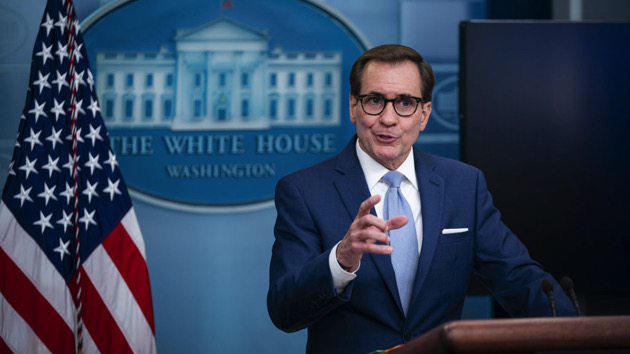(WASHINGTON) — John Kirby, the spokesperson for the White House’s National Security Council, on Sunday defended the Biden administration’s decision to send controversial cluster munitions to Ukraine despite the weapons’ risk to civilians — and numerous other countries forbidding their use.
In an interview with ABC This Week co-anchor Martha Raddatz, Kirby also addressed a newly revealed meeting between former American officials and Russia’s top diplomat earlier this year.
On cluster munitions, he insisted that Ukraine will seek to limit the impact of the bombs off the battlefield and said that keeping Russia from winning the war there will be the greatest thing the U.S. can do to protect non-combatants.
“I think we can all agree that more civilians have been and will continue to be killed by Russian forces — whether it’s cluster munitions, drones, missile attacks or just frontal assaults — than will likely be hurt by the use of these cluster munitions fired at Russian positions inside Ukrainian territory,” he said.
Kirby explained that the cluster munitions are being supplied now to make up for how quickly Ukrainian forces are using up their other artillery, at a rate of “many thousands of rounds per day.”
“This is literally a gun fight. … They’re running out of inventory,” he said. “We are trying to ramp up our production of the kind of artillery shells that they’re using most. But that production rate is still not where we wanted it to be.”
“So you’re sending those cluster munitions because we don’t have enough of the kind of munitions they need?” Raddatz clarified.
“That is right,” Kirby said.
He also suggested the bombs are intended to be temporary, “to help bridge the gap as we ramp up production of normal … artillery shells.”
The decision to provide the munitions comes as Ukraine’s new counteroffensive against Russia’s invasion moves more slowly than hoped, with Kyiv’s allies looking for ways to expedite the process of retaking occupied territory.
Cluster munitions are fired on a position and drop explosive bomblets over a wider area, raising the risk that unexploded ordinance can essentially turn into land mines, sitting in the ground long after being fired and able to be stumbled upon by civilians.
More than 120 countries have said they won’t use or make cluster munitions and U.S. allies like Germany, Spain and the United Kingdom have reiterated they won’t provide such weapons to Ukraine even though the U.S. is.
On This Week, Raddatz pressed Kirby about why America hasn’t banned the bombs.
He didn’t answer directly, instead saying, “We are very mindful of the concerns about civilian casualties and unexploded ordnance being picked up by civilians or children and being hurt. Of course, we’re mindful of that. And we’re going to focus with Ukraine on de-mining.”
He and other officials have maintained that the munitions will have a very low “dud rate” of unexploded bomblets.
Raddatz also pressed Kirby on the appropriateness of a meeting in April between former senior U.S. national security officials, including former diplomat and outgoing Council on Foreign Relations President Richard Haass, and senior Russian officials, including Foreign Minister Sergey Lavrov.
Kirby said the U.S. government was not involved in the talks but was generally aware of them, the first such public acknowledgment of this.
“We weren’t passing messages through them. We weren’t setting the stage for them,” he said. “We weren’t encouraging those discussions or engendering them in any way.”
Raddatz followed up: “Shouldn’t Ukraine have known about those meetings as well?” She also noted that “the Ukrainian officials I’ve talked to since then are not happy about that.”
Kirby said it “is not unusual for people … or other private entities to have discussions with Russian officials about any range of issues” but said, “The president has been adamant: There’ll be nothing said about Ukraine about ending this war without Ukraine at the table. So, I can understand the angst and concern about this. But again, I want to assure the United States government was not behind these talks.”
News of the talks, which broke last week, came just before President Joe Biden headed to Europe on Sunday, first to the U.K. and then to a NATO summit in Vilnius, Lithuania, where Ukraine’s membership is expected to be discussed.
Kirby said NATO will continue to support Ukraine but that Kyiv must implement economic and political reforms before joining the alliance — though it will continue to enjoy support from NATO in its fight against Russia until that happens.
That support includes F-16 fighter jets, which Ukraine has been pushing for but aren’t expected to arrive until the end of the year.
“We’re going to be working with some allies and partners to get the F-16 pilots the pilot training going very, very soon,” Kirby said, “and we’re going to work to get those jets to Ukraine just as quickly as possible.”
Kirby said the summit will show no cracks in the countries rallied to Ukraine.
“You’re going to see commitment by all the allies to continue to support their efforts to succeed on the battlefield. You’re also going to see from all the allies a concerted, unified approach to making it clear that NATO is eventually going to be in Ukraine’s future,” he said, “and that in between the time of the war ending and that happening, that the allies will continue to help Ukraine defend itself.”
Copyright © 2023, ABC Audio. All rights reserved.












